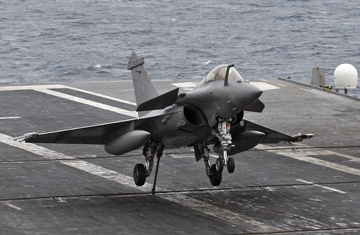
A Rafale fighter jet makes a cable arrest landing on the flight deck of French aircraft carrier "Charles De Gaulle"
On the face of it, it seems entirely natural that command and control of the military action against Muammar Gaddafi's regime in Libya was on Friday handed over to the North Atlantic Treaty Organization (NATO), which bills itself as the most successful defense alliance in history. While U.S. forces have dominated the operation so far, President Barack Obama is keen to relinquish the U.S.'s leadership role and spread the burden of the campaign. So on March 24, the hastily assembled coalition currently enforcing the no-fly zone over Libya agreed to pull its forces under the NATO umbrella.
Yet beneath the seemingly clear decision lies a muddle about who does what. France and Germany — so crucial for driving the European Union's agenda when united — are on different sides of the argument in this instance, with Berlin refusing to take part in the action. Italy, which has the best placed strategic land base for sorties against Libya, is struggling to overcome its long-time cozy links with Gaddafi — and is also fretting about a potential tide of migrants arriving at its shores. And few other European nations even have the means to join the military operations.
Worse, the plans for an operational handover to NATO were almost torpedoed by a spat between Turkey and France. Paris argued for a Franco-British command, saying that NATO is seen in the Arab world as a tool of U.S. power, and Arab support for the coalition is already weak. This view was opposed by Turkey, already doubtful about strikes on a fellow Muslim country: Ankara insisted on sole NATO command restricted to enforcing the no-fly zone and arms embargo, rather than continuing strikes against ground forces.
In turn, French President Nicolas Sarkozy baulked at the idea of Turkey holding a veto position on the coalition action, potentially limiting operations. The to-and-fro escalated, with Turkish Prime Minister Recep Tayyip Erdogan launching a withering attack on Paris for lacking a conscience. "I wish that those who only see oil, gold mines and underground treasures when they look in Libya's direction would see the region through glasses of conscience from now on," Erdogan said Thursday.
A compromise was eventually hammered out by NATO ambassadors in Brussels late on Thursday, giving the responsibility of day-to-day military command of the operation to NATO while political control goes to a new steering group composed of foreign ministers from Europe, Canada, the U.S. and various Arab nations. The transfer to NATO is set to take place by March 29, when the leaders of the coalition against Gaddafi gather in London for a special "contact group" conference.
At a separate E.U. summit in Brussels on Friday, leaders stressed their unity after the head-butting over the campaign. Sarkozy said that the agreed arrangement is the "best practical solution" at this time. "Someone has to do it," he said. "What else could we do? Should I invent machinery that competes with NATO? That would make no sense!" As part of the agreement, both Sarkozy and British Prime Minister David Cameron reserved the right to attack ground targets without being restrained by NATO rules.
But the bigger question for Sarkozy and Cameron is how to run the operation without U.S. leadership. Indeed, the main push to bring NATO into play came from Washington, where Obama — a late convert to military action in Libya — is loath to get U.S. troops entangled in another war in a Muslim state after Iraq and Afghanistan. Indeed, the Libyan campaign seems almost a reverse of the 1956 Suez crisis, which saw Britain and France forced to withdraw from another Arab nation, Egypt, when the U.S. loudly objected to their joint attack.
Yet, after more than 60 years of being able to look to the U.S. to ensure its security — and two decades after the end of the Cold War — Europe still finds it hard to accept that it should take the lead in handling a crisis on its doorstep. Sarkozy and Cameron have been at the vanguard of the diplomatic and military efforts to stop Gaddafi, cajoling fellow European nations, Arab countries, and even Obama (according to some accounts) into action. But although France and Britain have Europe's biggest militaries — and last November agreed an historic defense-cooperation treaty — they still rely on U.S. aircraft, missiles, intelligence and infrastructure to maintain the no-fly zone.
The handover to NATO may well herald the moment when Europe rises seamlessly to the challenge. With the U.S. stepping back from its Cold War commitments to NATO, and the E.U. talking increasingly about its security and defense activities, this is the obvious opportunity. But while Spain, Denmark, Italy, Greece, the Netherlands, Romania and Belgium are involved in the Libyan campaign, it is France and Britain that have assumed the effective command.
Key to this is the Franco-British relationship. Here, at least, Cameron and Sarkozy have built up a strong personal relationship, anchored by similar instincts on security, in particular, how to respond to the Arab uprisings. Early on Friday, before the E.U. summit, the two leaders met each other by chance in a Brussels park where they were both going for a morning run. They ran together for a while and chatted, followed by their respective entourages. This was an accidental meeting, but over the next few weeks they may well want to schedule joint jogging sessions.
